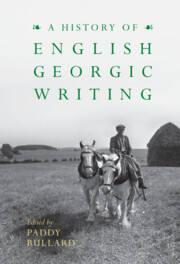Book contents
- A History of English Georgic Writing
- A History of English Georgic Writing
- Copyright page
- Contents
- Contributors
- A Note on National Designations
- Abbreviations
- Introduction
- Part I Turnings
- Part II Times
- Chapter 5 Jacobean Georgic
- Chapter 6 ‘Varieties too Regular for Chance’
- Chapter 7 Enlightenment, Improvement and Experimentation
- Chapter 8 Georgic, Romanticism and Complaint
- Chapter 9 Rural Labour in an Age of Industry
- Chapter 10 Labour Isn’t Working
- Chapter 11 Twentieth-Century Georgic
- Chapter 12 Rags and Tatters
- Part III Territories
- Bibliography
- Index
Chapter 10 - Labour Isn’t Working
The (F)ailing Georgics of Hardy’s Wessex Novels
from Part II - Times
Published online by Cambridge University Press: 01 December 2022
- A History of English Georgic Writing
- A History of English Georgic Writing
- Copyright page
- Contents
- Contributors
- A Note on National Designations
- Abbreviations
- Introduction
- Part I Turnings
- Part II Times
- Chapter 5 Jacobean Georgic
- Chapter 6 ‘Varieties too Regular for Chance’
- Chapter 7 Enlightenment, Improvement and Experimentation
- Chapter 8 Georgic, Romanticism and Complaint
- Chapter 9 Rural Labour in an Age of Industry
- Chapter 10 Labour Isn’t Working
- Chapter 11 Twentieth-Century Georgic
- Chapter 12 Rags and Tatters
- Part III Territories
- Bibliography
- Index
Summary
This chapter positions Thomas Hardy, and to a lesser extent his Wiltshire-born contemporary, Richard Jefferies, as case studies by which to assess broader environmental crises in the final decades of the nineteenth century. My central concern is with how the georgic sensibility, far from a passé or patrician enthusiasm in late-Victorian literature, has, in Hardy’s view, great analytical power and relevance. It allows him – especially in The Mayor of Casterbridge and The Woodlanders – to probe moral attitudes towards, and economic theories about, manual toil in an age of capitalist accumulation. In these novels Hardy interprets georgic motifs, values and sources through his portrayal of the pugnacious ‘corn king’ Henchard and the introverted yeoman Winterborne, respectively. In both texts, I contend, Hardy documents an indigenous land-worker’s increasingly fraught dispute with, and gradual supplanting by, a more ruthlessly hard-headed arriviste.
- Type
- Chapter
- Information
- A History of English Georgic Writing , pp. 215 - 234Publisher: Cambridge University PressPrint publication year: 2022

